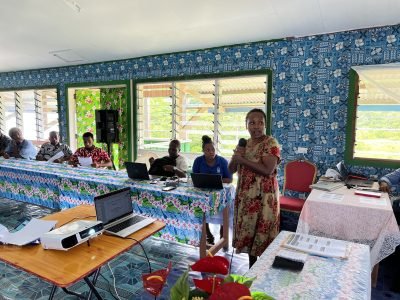Securing land rights in Rennell and Bellona through customary land recording and development of bylaws
More than 90 landholding group representatives from Rennell and Bellona attended a series of consultation and awareness programs to learn how to make customary land available and accessible for the future development of Solomon Islands through customary land recording and development of bylaws.
Throughout the two one-week programs held separately in Tigoa (Rennell) and Anua (Bellona), customary landholding groups from ten wards had an opportunity to learn more about the implications of the bylaws on customary landholding groups administration and governance after the customary land recording process, which is currently ongoing, is completed.
Furthermore, as part of the customary land recording process, the Ministry of Lands, Housing and Survey collected views to support the development of bylaws that define standards and principles for equitable governance of the landholding group.
In Solomon Islands, as well as throughout the Pacific, the land is a fundamental part of traditional culture. Customary land is acknowledged and protected in most provinces’ state policies and laws.
In provinces like Rennell and Bellona that have a patrilineal system, women’s direct access to land through purchase or inheritance is often limited. Yet, women remain the main providers for households through farming and cultivating food, there are usually customary provisions for indirect access to land in terms of land-use rights acquired through kinship relationships and their status as wives, mothers, sisters, or daughters.
Reflecting on previous land recordings completed in the country, Ms Mary Tegavota, National Recorder, Ministry of Land, Housing and Survey said that addressing land issues is “not easy, but it is essential for peacebuilding.”

Mary E. Tegavota, National Recorder, Land Reform Unit, Ministry of Lands, Housing and Survey presents the customary land recording process to the landholding groups
“It plays an essential role in empowering people and building sustainable peace in Solomon Islands’ communities. We are bridging gaps between customary land groups and laying strong foundations for harmonious relations, social cohesion, and sustainable development.”
The main purpose of customary land recording is to record the land rights of customary landholding groups.
It also allowed the recording of their genealogy, which is now officially recognized and subsequently will be registered in the Repository of the Central Land Records Office of the Ministry of Lands, Housing and Survey.
Designed based on previous peacebuilding projects on customary land recording in Solomon Islands, the Ministry in partnership with the UN Development Programme and World Vision in Solomon Islands anticipates supporting youth and women’s participation in land recording and in the development of bylaws for the management of their communal land. Particularly, the bylaws should highlight the role of youth and women in the decision-making process on the management of the land and natural resources in their communities.
“As we begin to record land, people should understand that it will benefit not just one person or family or a group of individuals, but everyone in your community in years to come,” said Ms Hellen Ohukeni, Director of Tribal Land Recording Unit, Ministry of Lands, Housing and Survey.
Ms Ohukeni also noted that integration and inclusion policies at both provincial and national levels are “vital for provinces, communities, and tribes, and contribute to resilient communities and sustainable development.”
By the end of the consultation and awareness program, it is expected that the customary landholding men and women’s representatives will have a better understanding of the proposed customary landholding group bylaws, and the feedback on the bylaws will also be used for the policy paper’s development.
“Consultations programs like this serve as a platform where all voices and different views are heard and taken into account,” one of the landowners stated.
The consultation and awareness program will be followed by one more consultation for Honiara-based landowners. It is led by the Ministry of Lands, Housing and Survey and supported by the Bridging traditional governance and the rule of law through youths’ participation as agents of peace and change in Rennell and Bellona funded by the UN Peacebuilding Fund.
ENDS//
– UNDP
